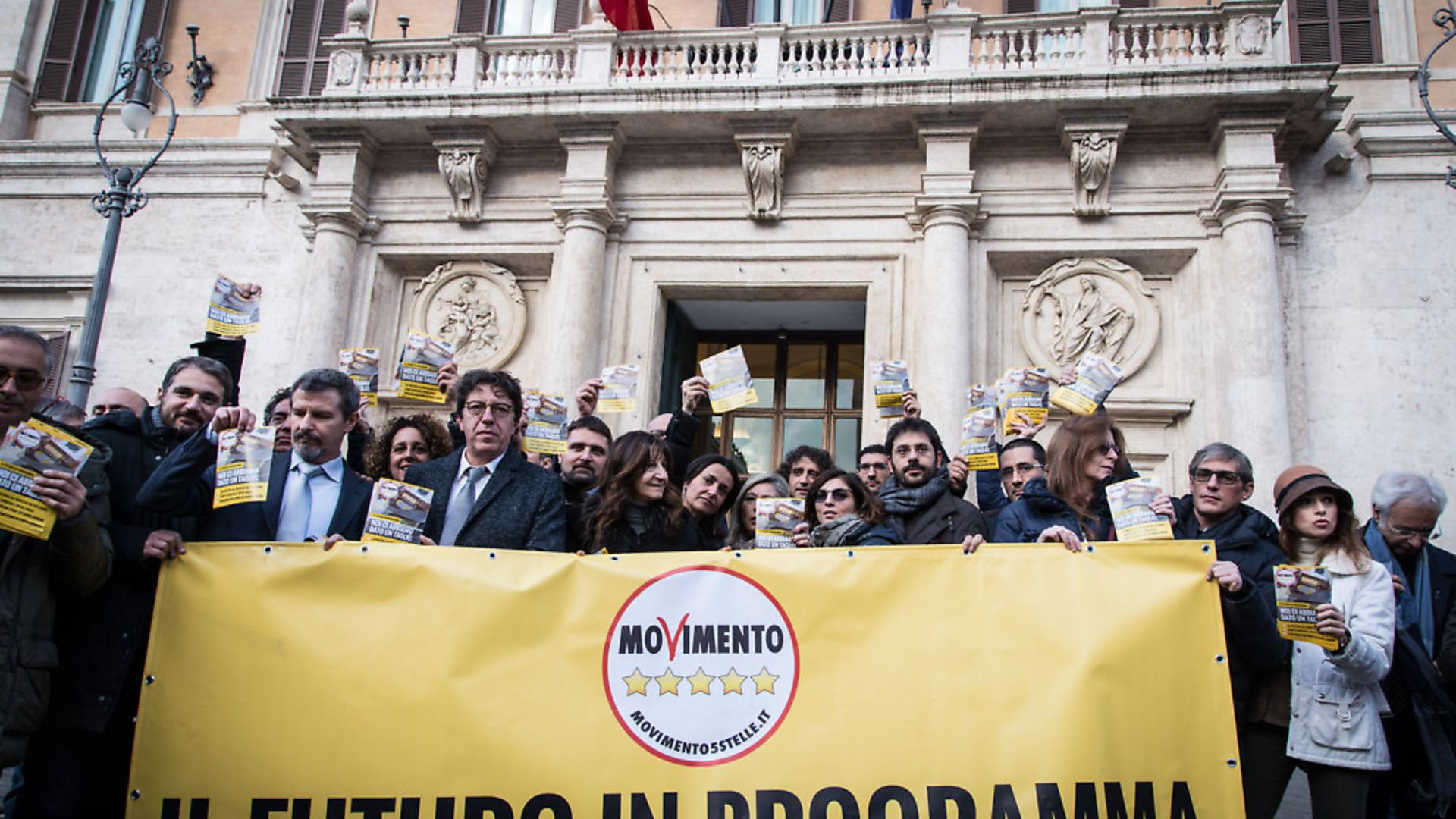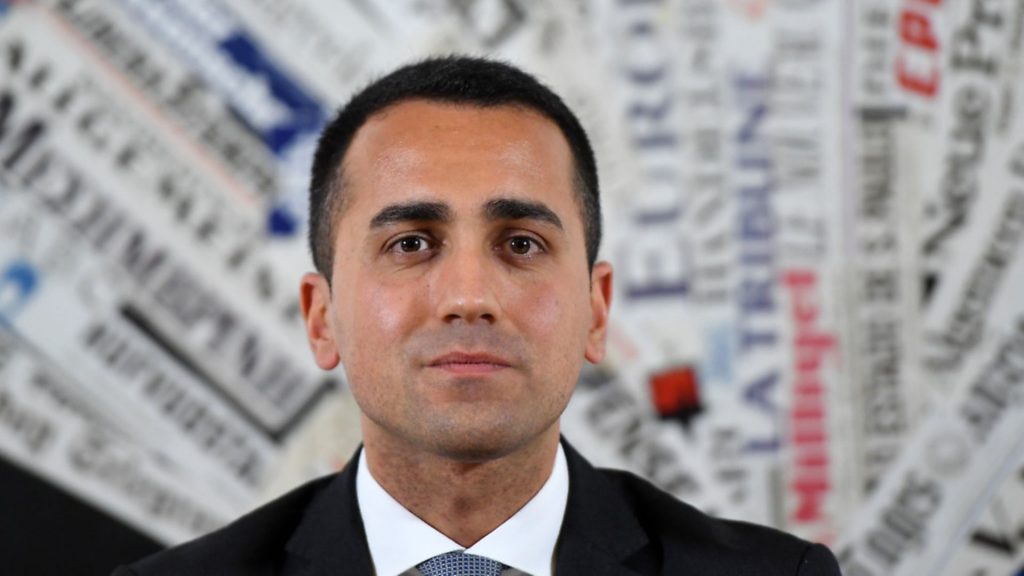
The remarkable rise of Italy’s Five Star Movement is inspiring copycats elsewhere in Europe. But, as HANNAH ROBERTS explains, its innovative, technological strategy masks a movement without a soul

Talks to form Italy’s next government might be locked in characteristic impasse, but it is the Five Star Movement which is calling the shots. Having polled more votes than any other party in last month’s general elections, the world’s first internet-based political force looks set to be part of any workable coalition.
The most likely option, at the moment, is leading a populist, eurosceptic coalition with the far-right League, if they can be convinced to break with their ally Silvio Berlusconi.
Five Star’s astonishing trajectory to the top, less than nine years from its launch as a unique social experiment, was achieved by its pioneering digital democracy. The movement harnessed the power of the web, offering populist policies to draw support from left and right. It is a strategy which has intrigued parties across Europe and across the political spectrum, that are looking to learn lessons from the Italians.
But the potential growth of those policies favoured by Five Star, across Europe, including support for Russia, has prompted widespread alarm. And there are, say the movement’s critics, multiple reasons to be concerned about the future international roll-out of imitations.

Opponents say Five Star is ideologically bankrupt, with opaque backing, and an Orwellian power structure. Its websites have been accused of social conditioning, and spreading disinformation via a digital army of supporters. Such concerns are particularly worrying in the light of the mounting evidence of the dangerous potential for data harvesting, online micro-profiling and targeted ads.
Recent revelations about Facebook and Cambridge Analytica have demonstrated the ease with which third parties can extract personal data from the web and use it against us, for political or financial gain. Unlike mainstream media debate, which might well be biased but is open to scrutiny, offering us some protection, parties targeting voters online are able to promise all things to all people with no accountability.
While the Trump campaign and Vote Leave (and Remain) used data companies to target voters, Five Star has no need of help from external agencies.
Its potential for data-led psychological targeting is comprehensive thanks to its distinctive web-based structure.
Founded by the late web-entrepreneur Gianroberto Casaleggio, with comedian Beppe Grillo as front man or ‘influencer’, Five Star has no physical headquarters – its only home is the web. Until recently Casaleggio’s company ran Grillo’s blog, which acted as the party’s newspaper and main propaganda tool. Five Star’s party business (including candidate selection and voting on policies) is now conducted through its own web platform, Rousseau Association, named after the Enlightenment-era philosopher.
In exchange for direct digital democracy, members provide personal details, and vote on policies and candidates, giving Five Star’s leaders unfettered access to their data and political views. By last year Rousseau had acquired the government-issued ID and address of at least 140,000 registered members, aiming for a million members by the end of 2018. ‘Five Star is the first political force built on the possession of data,’ says journalist Jacopo Iacoboni, author of The Experiment, a new book on the movement. ‘It is unique in the world.’
When Casaleggio died in 2016, his son Davide inherited the family web consultancy Casaleggio Associati, and with it, the keys to the party – the antithesis of democracy.
Although he claims to be merely ‘a humble activist’, Davide created the Rousseau portal and is the gatekeepers to Five Star’s galaxy of blogs, social media pages and websites. ‘Whoever manages the portal has access to all data, to the votes, to everything that happens within the Five Star Movement, giving them leverage over the rest,’ explains Marco Canestrari, a former Casaleggio Associati developer.
Casaleggio’s position as both manager of Rousseau and head of an internet consultancy business advising on e-commerce and web-marketing renders Five Star both a party and a company, in the eyes of many, creating a conflict of interest. Both party and company have benefitted from a populist-based news agenda including conspiracy theories which have driven more traffic to blogs and websites, boosting income from online advertising.
As Massimo Artini, a former Five Star senator says: ‘As long as they have 20 million page views a week, they don’t care about politics.’ While there is no evidence that Casaleggio Associati has sold data to third parties, or used it for the benefit of its clients, it is possible that companies or even hostile foreign states wishing to have political influence might, in the future, be tempted to pay for the consultancy’s services, creating a conflict of interest.
One serious concern is that Five Star has not kept the data safe. R0gue_0, a hacker, who infiltrated the Rousseau system, claimed to have sold the database on. An inquiry by Italy’s data protection watchdog established that e-votes are archived with the telephone number of the voter, ‘remaining attributable to a specific voter and allowing retrospective processing with the possibility, in the abstract, of profiling the members on the basis of each choice or preference expressed’. The system risked violating citizens’ rights, the report found. Five Star says it is working to make votes anonymous, using blockchain technology.
While there is no evidence that Five Star has used micro-targeting on its members, it has created an army of digital activists to disseminate coordinated online messages, according to Arnaldo Capezzuto, former communications chief of the Campania region, who says he was dismissed after objecting to ‘unverified and aggressive content’. He alleges that the campaigns are disinformation and fake news, as well as mudslinging attacks against adversaries. One opponent in the Democratic Party was accused of links to the Camorra mafia, without evidence.
In February instructions given in a phone chat by the head of the Five Star communications team for Veneto, Ferdinando Garavello, emerged, in which he urged candidates to dig up embarrassing material on opponents.
Five Star’s appeal is rooted in its willingness to embrace populist policies, from both left and right, such as opposition to immigration, and universal basic income.
Some of the movement’s more controversial long-stated aims have included the freedom to choose whether children are vaccinated, pulling the country out of Nato, dropping sanctions against Russia and insisting on the removal of US air bases.
Individual parliamentarians have often created confusion about the party line by offering radically different stances. Five Star’s candidate for prime minister, Luigi di Maio, has been rowing back on promises such as a referendum on leaving the euro, part of attempts to project moderation since the election campaign began. Others, such as MEP Fabio Castaldo, maintain the original stance and are threatening to bypass Italy’s fiscal contract with the EU.
Critics say Five Star is purposefully vague to keep its anti-establishment core without alienating mainstream Italian voters. ‘It’s a weird animal,’ says Iacoboni. ‘Its policies are elusive, in some ways it’s like a mirror party, everyone sees their own views reflected. It’s a skeleton that you can put any skin on.’
Such lack of an over-riding belief system is dangerous, says Nicola Biondo, former communications chief for Five Star in the lower house, because the movement will adopt the policies of anyone who will support it. ‘It was conceived as a marketing product. Its only aim is to get power and consensus. Once it takes power it has no ideology so it immediately becomes a tool for other structures, business, or even states.’
A willingness to accept support from ambiguous partners can be seen in Five Star’s increasing support for Russia since 2014. Senior MPs visited Russia, meeting with Putin’s aides in 2016.
The same year the movement presented a bill to parliament asking for Nato membership to be reviewed every two years.
After the vote this month, Di Maio said that he would like to see sanctions against Russia reviewed ‘in the interests of Italians’, while refusing to condemn the nerve attack on Sergei Skipral and his daughter Yulia, in Salisbury.
If Five Star are part of the next government, Britain can expect little support from Italy against Putin. Italy’s Foreign Ministry under the caretaker government felt able to expel only two diplomats in response to the Skripal poisoning, in solidarity with the UK, compared to four from Germany. Their likely future bedfellows the right-wing League party, condemned the expulsion of Russian diplomats from Italy after the spy attack. While Di Maio has of late been making reassuring noises towards Nato, such overtures have already attracted criticism on the party blog with members claiming their contribution to digital democracy is ‘pointless’ if leaders change tack.
Paradoxically, Italy one of the slowest countries for digital development in Europe, may have the world’s first web-based government, although it is unlikely to be the last.
In the UK, Arron Banks the insurance magnate who helped bankroll Brexit has expressed an interest in building an online-based populist movement in Five Star’s image. With the continued shrinking of UKIP, it is easy to imagine how such a group could get off the ground.
In countries with proportional representation, the potential for Five Star clones is even greater. Even before the Italian election Max Bugani, one of the managers of the Rousseau system, claimed he had been contacted personally by groups in France, Holland and Spain for advice on recreating the movement. ‘There are so many curious people,’ he said.
It looks like Europe is going to have to get used to Five Star, and the destabilising effect it creates.









